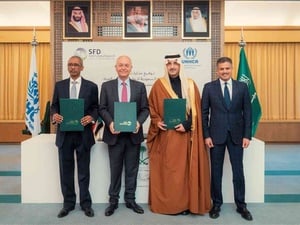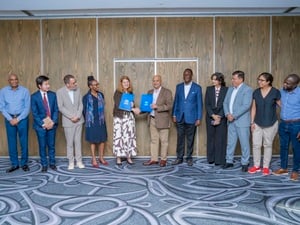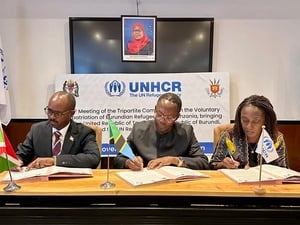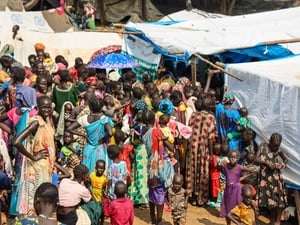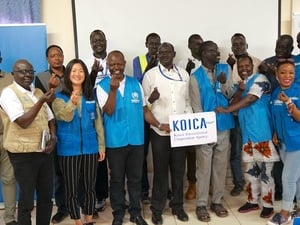European Union steps up support for people displaced from the Sahel into coastal countries
European Union steps up support for people displaced from the Sahel into coastal countries

Refugee women and those from the host community in a discussion group in Kogdago, Togo.
Abidjan, Côte d’Ivoire, 20 June 2025: As conflict continues to uproot communities across the Central Sahel, the European Union (EU) has announced €10 million in new funding to support forcibly displaced people and the communities hosting them in the neighboring coastal countries of Benin, Côte d’Ivoire, Ghana, and Togo.
The funding is part of a broader regional initiative called "Unite", aimed at strengthening the resilience of both displaced populations and their host communities. Over the next two years, the project will be jointly implemented by the International Organization for Migration (IOM), the UN Refugee Agency (UNHCR), the UN Children’s Fund (UNICEF) and the World Food Programme (WFP), in partnership with national and local partners.
Currently, the northern regions of Côte d'Ivoire, Benin, Togo, and Ghana host around 160,000 refugees and asylum seekers, mostly from Burkina Faso. Internal displacement is also growing in parts of the northern areas of Togo and Benin. Many of these communities already face severe challenges, including poverty and limited access to basic services.
Through this joint effort, the four UN agencies will deliver coordinated support across key areas.
IOM will support the integration of displaced persons and refugees into local food systems by strengthening community-based cooperatives to produce and market nutritious food, boosting livelihoods and improving access to healthy diets. This approach will enhance economic resilience and social cohesion in fragile border areas while reinforcing local value chains. Using the Displacement Tracking Matrix (IOM), IOM will also generate critical data on mobility and community to inform evidence-based planning in northern Togo and Benin.
UNHCR will lead on collecting and analyzing socio-economic data to improve access to national services such as education, health, and livelihoods for refugees and asylum seekers. It will also prioritize access to safe, dignified, climate-resilient, and appropriate housing for the most vulnerable, alongside expanding access to electricity and clean cooking solutions in underserved communities.
UNICEF will improve access to quality, safe, and inclusive education for displaced children, while strengthening child protection, GBV prevention, and safeguards against sexual exploitation and abuse. The organization will also promote continued learning and build local capacity to foster social cohesion.
WFP will support vulnerable households with multipurpose cash transfers to help meet essential needs, particularly food. It will also work to improve nutrition and livelihood opportunities, focusing on women and children, through support to school canteens. To help communities better cope with the impacts of the climate crisis, WFP will work to build resilience to climate change and improve water access for agriculture and livestock.
Francesca Di Mauro, Ambassador of the European Union in Côte d’Ivoire, emphasized the EU’s solidarity with displaced people and their hosts. “Our support aims not only to address urgent humanitarian needs but also to build long-term resilience for both displaced populations and host communities. Through Project UNITE, we reaffirm our commitment to regional stability, protection of human rights, and inclusive development in West Africa”.
Olivier Beer, Representative of UNHCR Multi- Country offices of Côte d’Ivoire, welcomed the EU’s contribution. “As the influx of displaced persons continues, we commend the EU’s support for these essential protection activities. Registering asylum seekers and refugees, collecting socio-economic data for inclusive development and increasing resilience of host and refugee communities are fundamental to ensuring both protection and stability. We thank the EU for its contribution, which will reinforce social cohesion, security, and regional stabilization.”
For more information, please contact:
In Abidjan, Sulaiman Momodu, [email protected] and Louis Falcy, [email protected]


